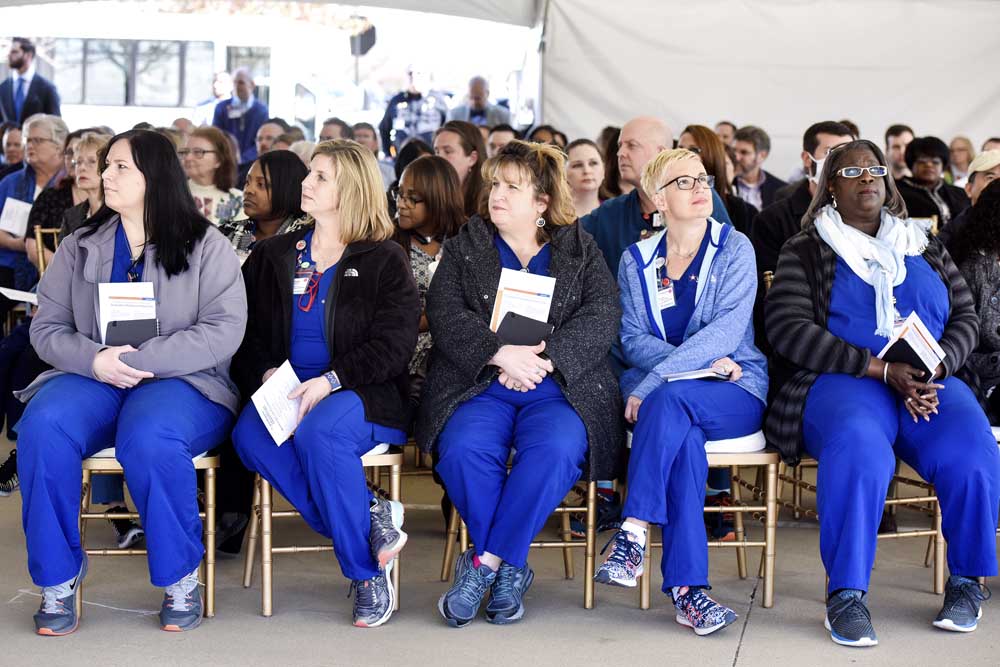Tyler hospital launches facility with MD Anderson Cancer Center
Published 4:20 pm Wednesday, January 24, 2018

- People listen during a dedication and celebration ceremony for the UT Health Northeast MD Anderson Cancer Center at UT Health Northeast in Tyler, Texas, on Wednesday Jan. 24, 2018. The two medical centers announced their partnership in Nov. 2016 and had a soft opening in Oct. (Chelsea Purgahn/Tyler Morning Telegraph)
East Texans can now get cancer treatment from the MD Anderson Cancer Center without traveling to Houston, thanks to a new partnership with Tyler’s academic medical center.
UT Health Northeast unveiled and dedicated its new cancer center in partnership with the Houston-based hospital on Wednesday afternoon, surrounded by more than 200 community leaders, health care providers and members of the public.
The new facility is called UT Health Northeast MD Anderson Cancer Center. It started with a partnership between the two institutions in November 2016 and started seeing patients in October. Wednesday marked the dedication and celebration.
Dr. Kirk Calhoun, the president of UT Health Northeast, said his hospital identified a need for improved cancer care years ago. Calhoun said the hospital had data showing that, at the time, about half of cancer patients in the area were traveling to another region for their treatment.
“We knew that if we built something with MD Anderson, then we could do something very special for this community and make sure that there would be an opportunity for people” to get their care locally, Calhoun said.
MD Anderson Cancer Center’s main location in Houston is about a four-hour drive from Tyler. The hospital is consistently ranked No. 1 for cancer care by U.S. News & World Report’s annual “Best Hospitals” survey.
Calhoun said one-sixth of cancer patients who are referred to MD Anderson have been misdiagnosed. He said that gives the new facility an opportunity to work closely with MD Anderson to make sure diagnoses are correct from the beginning.
Dr. Ray Greenberg, an executive vice chancellor for the University of Texas System, cited high rates of lung cancer and skin cancer in East Texas in comparison to the state as a whole and the United States.
“We need to do everything we can to enhance our prevention programs, and we’re very grateful that MD Anderson is a world leader in cancer prevention and control,” Greenberg said.
“For those cancers that we can’t prevent, we need to make sure that we detect them as early as possible when they’re at their most treatable stage,” he added.
Kevin Eltife, a former state senator and currently a member of the University of Texas board of regents, called MD Anderson “the pride of the UT system” because of its international reputation for cancer treatment.
“The partnerships that we’re building — the health care that we’ll be able to provide for our citizens — will be unmatched anywhere in this country,” Eltife said.
Dr. William Hyman, the interim medical director for the facility, said it has been seeing approximately 80 patients per day. It is currently staffed by four oncologists and a nurse practitioner, plus nurses and other support staff, and plans to hire two more doctors.
Hyman said East Texans who need cancer treatment would benefit because they will have more time for self-care and can spend less time traveling. He said self-care can help thwart depression.
“Some people just have no support” to get to Houston, he said. “They can’t get 210 miles south and stay in a hotel for a few weeks. It’s not enough family, or not enough money, or they just don’t have the energy and reserves to go back and forth like that.”
Hyman said the facility plans to take patients regionally and continue to grow. He said patients would come from as far south as Lufkin, as far north as the Red River, as far west as Terrell, and as far east as Shreveport.
“(If) you go to Dallas or Houston you’re paying $12 a day for parking. You’re fighting rush hour,” Hyman said. “Or you can come up here— same distance, valet parking for free, you’ve got hands-on very, very patient-centered care, with the same level of quality, the same precision diagnostics.”
Some patients will still need to go to Houston, Hyman said. The Tyler facility won’t have the ability to do bone marrow transplants, proton radiation or treat pediatric oncology patients, he said.
Michelle Wells, a spokeswoman for UT Health Northeast, said the facility also sees an opportunity to bring in patients from the nearby states of Oklahoma, Arkansas and Louisiana.
TWITTER and INSTAGRAM: @_erinmansfield






